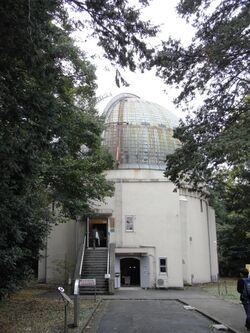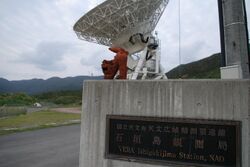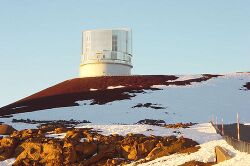Organization:National Astronomical Observatory of Japan

The National Astronomical Observatory of Japan (国立天文台 kokuritsu tenmondai) (NAOJ) is an astronomical research organisation comprising several facilities in Japan , as well as an observatory in Hawaii and Chile . It was established in 1988 as an amalgamation of three existing research organizations - the Tokyo Astronomical Observatory of the University of Tokyo, International Latitude Observatory of Mizusawa, and a part of Research Institute of Atmospherics of Nagoya University.
In the 2004 reform of national research organizations, NAOJ became a division of the National Institutes of Natural Sciences.
Facilities
- Mitaka Campus (Mitaka, Tokyo. [ ⚑ ] 35°40′31″N 139°32′17″E / 35.6752172°N 139.5380831°E)
- The Headquarters, Astronomy Data Center, Advanced Technology Center, Public Relations Center
- Solar Flare Telescope, Sunspot Telescope, TAMA 300 gravitational wave detector
- Tokyo Photoelectric Meridian Circle
- Historical instruments: Solar Tower Telescope, 65cm refractor dome, 20cm refractor dome
- Nobeyama Radio Observatory[2] (Minamimaki, Nagano, [ ⚑ ] 35°56′28″N 138°28′13″E / 35.9410112°N 138.4702528°E)
- 45m Millimeter Radio Telescope, Nobeyama Radio Polarimeter
- Decommissioned instruments: Nobeyama Millimeter Array, Nobeyama Radio Heliograph
- Mizusawa VLBI Observatory (Ōshū, Iwate. [ ⚑ ] 39°08′06″N 141°08′00″E / 39.1350952°N 141.1332035°E)
- VERA Mizusawa Station (20m radio telescope), 10m VLBI radio telescope
- Historical building: Dr. Kimura Museum
- VERA Ogasawara Station (Ogasawara. [ ⚑ ] 27°05′30″N 142°13′00″E / 27.09167°N 142.2166667°E)
- 20m radio telescope
- VERA Iriki Station (Iriki. [ ⚑ ] 31°44′52″N 130°26′24″E / 31.7478213°N 130.4399443°E)
- 20m radio telescope
- VERA Ishigakijima Station (Ishigakijima. [ ⚑ ] 24°24′43.83″N 124°10′15.58″E / 24.412175°N 124.1709944°E)
- 20m radio telescope
- KAGRA (Hida, Gifu. [ ⚑ ] 36°24′42.84″N 137°18′20.88″E / 36.4119°N 137.3058°E)
- KAGRA gravitational wave telescope
- Ishigakijima Observatory (Ishigakijima)
- Murikabushi telescope
- Hawaii Observatory (Hawaii)
- Subaru 8m telescope (Mauna Kea). [ ⚑ ] 19°49′33″N 155°28′35″W / 19.825814°N 155.476455°W)
- Hilo Base Facility (Hilo, Hawaii. [ ⚑ ] 19°42′10″N 155°05′25″W / 19.70289°N 155.0902498°W)
- Chile Observatory (Atacama Desert, Chile )
- Atacama Large Millimeter/submillimeter Array
- Atacama Submillimeter Telescope Experiment (ASTE)
- Decommissioned Facilities
- Norikura Solar Observatory (Mount Norikura, Nagano, [ ⚑ ] 36°07′01″N 137°33′09″E / 36.116925°N 137.552528°E)
- Formerly under NAOJ and decommissioned in 2010. Building reused for research purposes, including non-astronomical work for the National Institute of Natural Sciences.
- Okayama Astrophysical Observatory (Mount Chikurinji in Asakuchi, Okayama. [ ⚑ ] 34°34′34″N 133°35′39″E / 34.5760726°N 133.5941148°E)
- Facility still belongs to NAOJ, but its 188cm telescope is now operated by the Tokyo Institute of Technology.[3]
- Decommissioned telescopes: 91cm telescope, 65cm Coude-Type solar telescope
NINS
In 2004, NAOJ, in alliance with four other national institutes – the National Institute for Basic Biology, the National Institute for Fusion Science, the National Institute for Physiological Sciences, and the Institute for Molecular Science – established the National Institutes of Natural Sciences (NINS) to promote collaboration among researchers of the five constituent institutes.[4]
Projects with NAOJ involvement
- ALMA, ASTE
- SELENE
- VSOP, VSOP-2
- Hinode (Solar-B)
- SPICA (satellite)
- JASMINE
- Hubble Origins Probe
See also
References
- ↑ "European Antennas at ALMA’s Operations Support Facility". ESO Picture of the Week. http://www.eso.org/public/images/potw1326a/.
- ↑ "Information of Telescopes, Nobeyama Radio Observatory". NAOJ. https://www.nro.nao.ac.jp/en/public/teles.html.
- ↑ "Birth of Okayama Astro-Complex". NAOJ. https://www.nao.ac.jp/en/gallery/weekly/2018/20180327-oao.html.
- ↑ NINS outline
External links
 |




